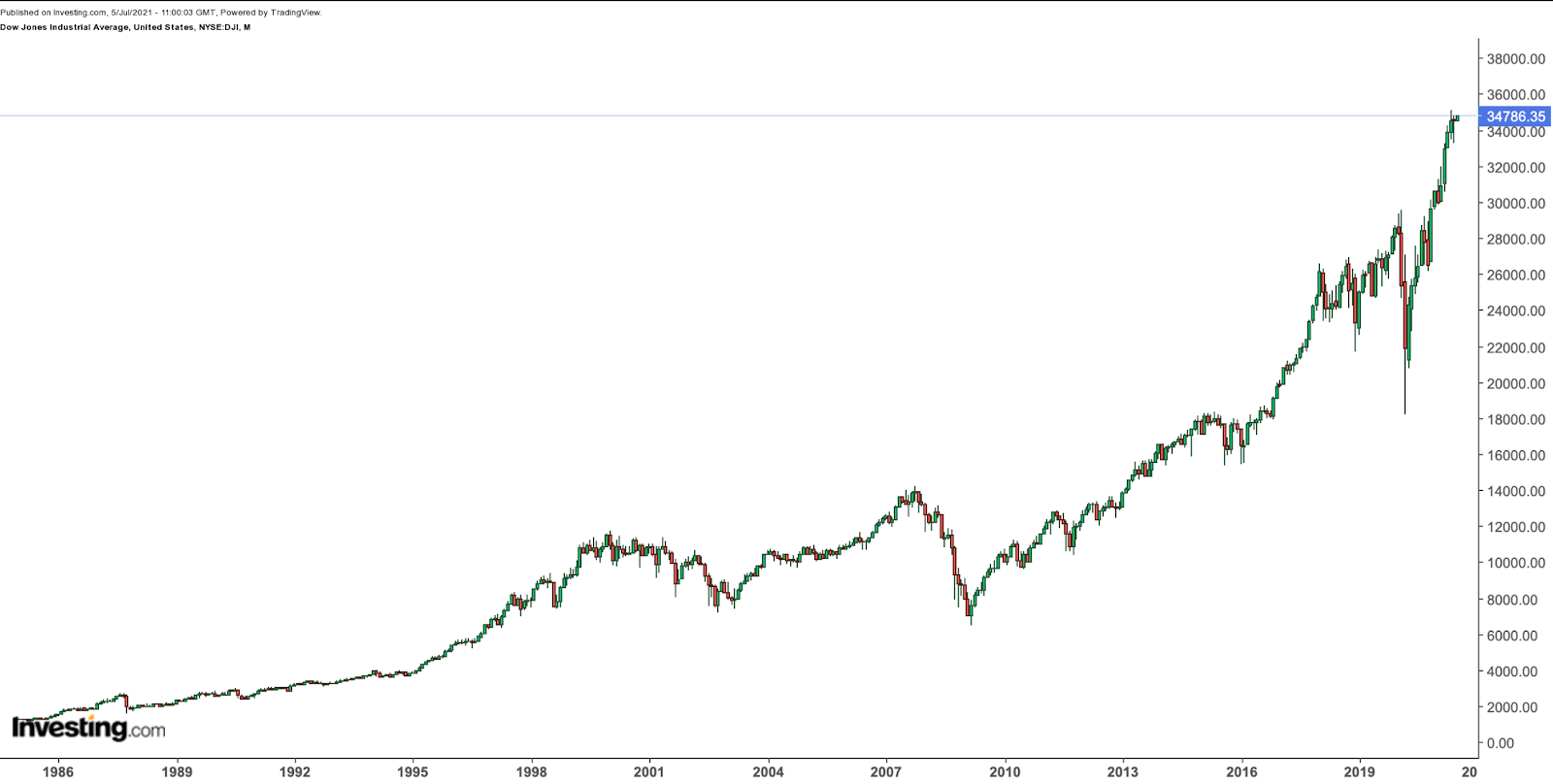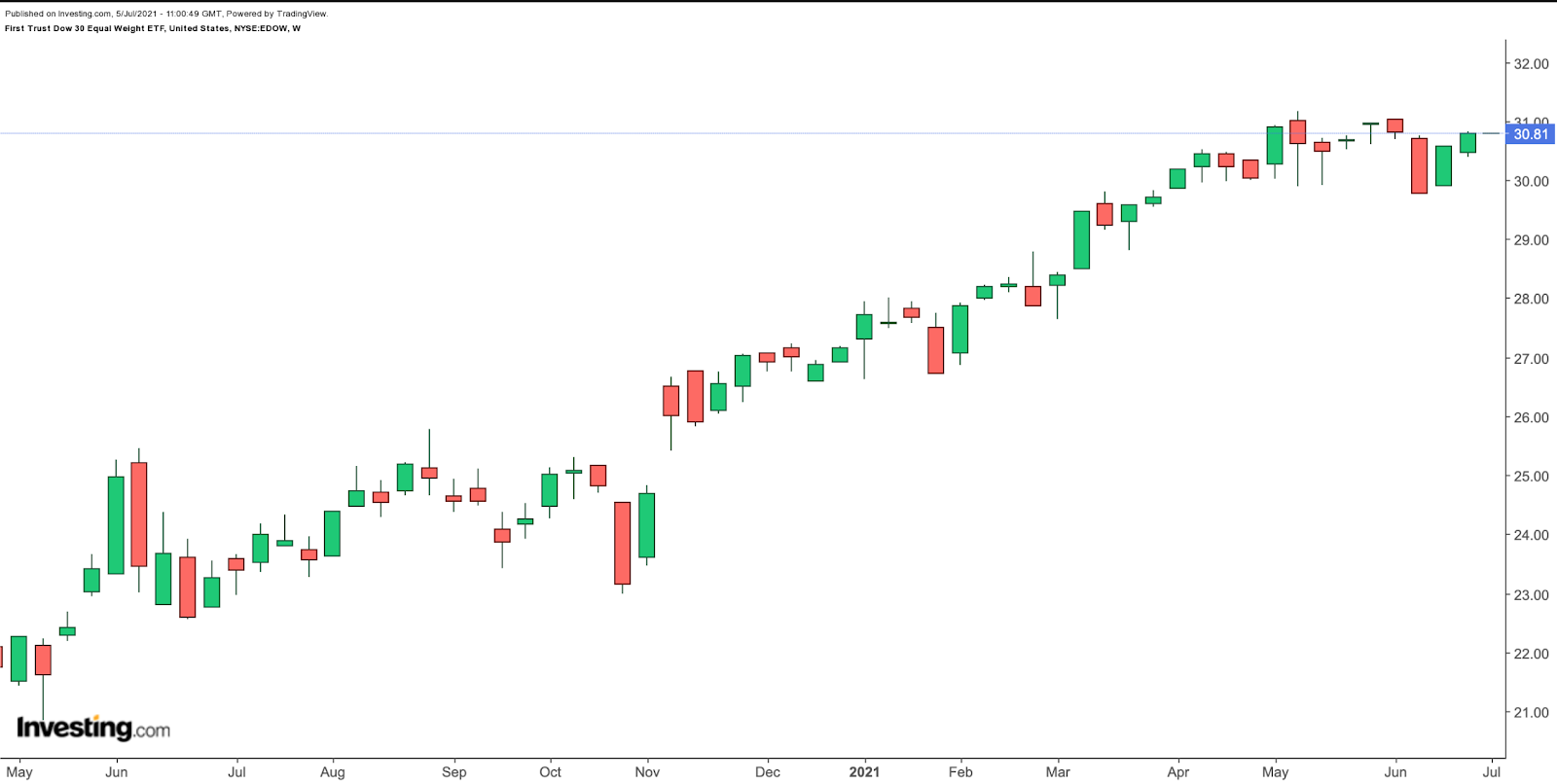The Dow Jones Industrial Average (DJIA)—also referred to as the Dow 30—has returned 13.6% so far in 2021. The index, which is among the most widely followed equity indices worldwide, hit an all-time high (ATH) in early May.
Launched in 1896, the DJIA originally consisted of 12 stocks. Of the original members, only General Electric (NYSE:GE) remains in business. However, the company was removed from the index in 2019.
The current 30 blue-chip stocks have leading market positions or wide moats in their respective industries. Most investors regard such blue-chip shares as safe havens against volatility and economic downturns.
The Dow Jones Industrial Average is a price-weighted index. In other words, index members are ranked based on their share prices, and companies' higher prices receive a greater weight in the DJIA. By comparison, the S&P 500 index, which is up almost 15.9% in 2021, is a market-capitalization-weighted index.
As another earnings season begins, many investors wonder if now would be a good time to invest in an exchange-traded fund (ETF) that focuses on the Dow 30. Although volatility typically increases during the reporting season, buy-and hold investors should ideally not worry too much about daily price swings.
The composition of an index typically changes over time. Therefore, looking at average returns does not always give the complete picture. However, most financial planners and online financial sites point out that according to decades-long data, the annual average return of the DJIA is around 7%.
We previously covered several ETFs that could be appropriate for those who want to buy the Dow 30. They include:
SPDR Dow Jones Industrial Average ETF (NYSE:DIA)—up 13.8% year-to-date (YTD), covered here;
Invesco Dow Jones Industrial Average Dividend ETF (NYSE:DJD)—up 15.2 YTD, covered here.
Today, we extend the discussion to another fund.
First Trust Dow 30 Equal Weight ETF
- Current Price: $30.81
- 52-Week Range: $22.96 - $31.16
- Dividend Yield: 1.51%
- Expense Ratio: 0.50% per year
The First Trust Dow 30 Equal Weight ETF (NYSE:EDOW) tracks the returns of the Dow Jones Industrial Average (DJIA) Equal Weight Index. In other words, unlike the DIA ETF, it is not price-weighted. In an earlier article, we discussed how equal-weight funds could help diversify long-term portfolios.

EDOW, which is quarterly rebalanced, holds 30 stocks. It started trading in August 2017. As far as sector allocations are concerned, information technology (IT) leads with 23.37%, followed by health care (13.83%), consumer staples (13.70%), industrials (13.25%) and financials (12.62%)
Top ten holdings comprise around 35% of total net assets of about $108 million. Global athletic apparel group Nike (NYSE:NKE), consumer technology darling Apple (NASDAQ:AAPL), another technology pioneer Microsoft (NASDAQ:MSFT), home improvement retailer Home Depot (NYSE:HD), and cloud-based enterprise software provider Salesforce.com (NYSE:CRM) are currently the leading five names in EDOW.
By comparison, the DIA ETF’s top five names are the managed healthcare and insurance giant UnitedHealth Group (NYSE:UNH), global investment banking group Goldman Sachs (NYSE:GS), Home Depot, Microsoft, and biotechnology company Amgen (NASDAQ:AMGN). The top 10 stocks make up over 52% of DIA.
EDOW returned 32.3% in the past 52 weeks and 13.4% YTD. Like the DJIA index, it also saw a record high on May 10. Its trailing P/E and P/S ratios stand at 22.60 and 2.60, respectively.
Seasoned investors mainly regard broader averages as leading indicators. The long-term trend for the index and funds that follow its returns remains bullish, reflecting the overall robust state of the US economy. Interested readers could regard potential dips as an opportunity to invest in EDOW, which would give access to the oldest continuous barometer of the US equity market.
